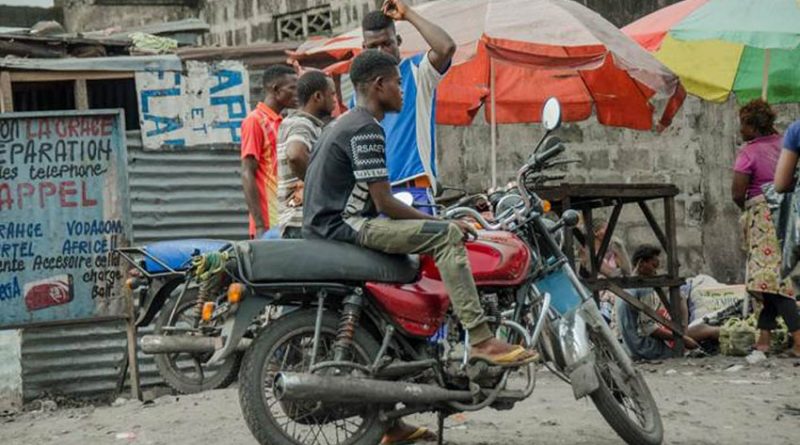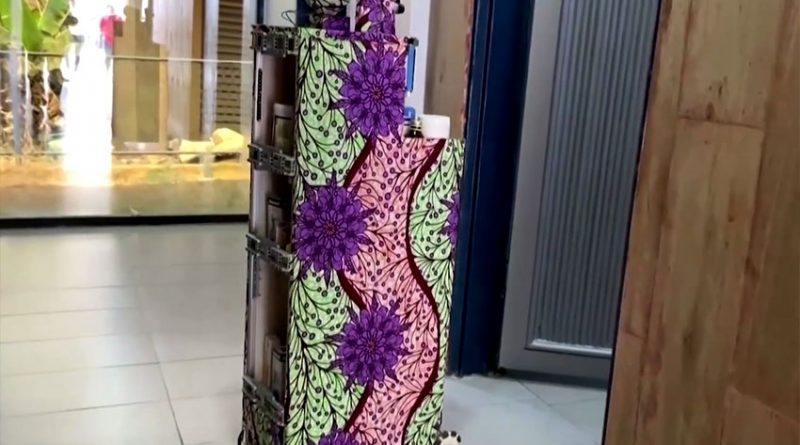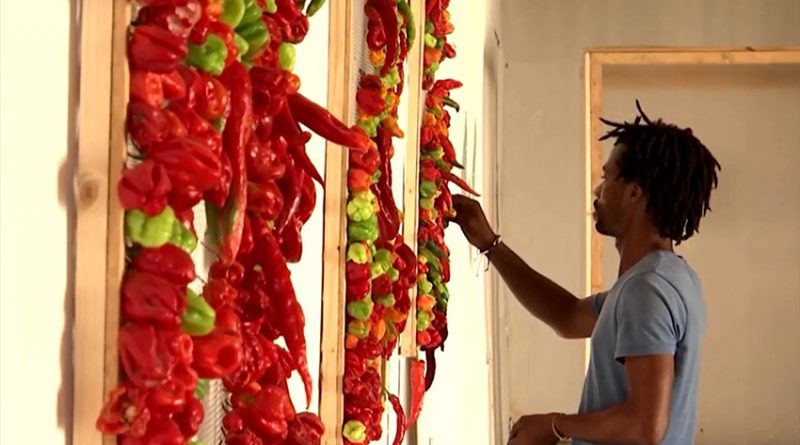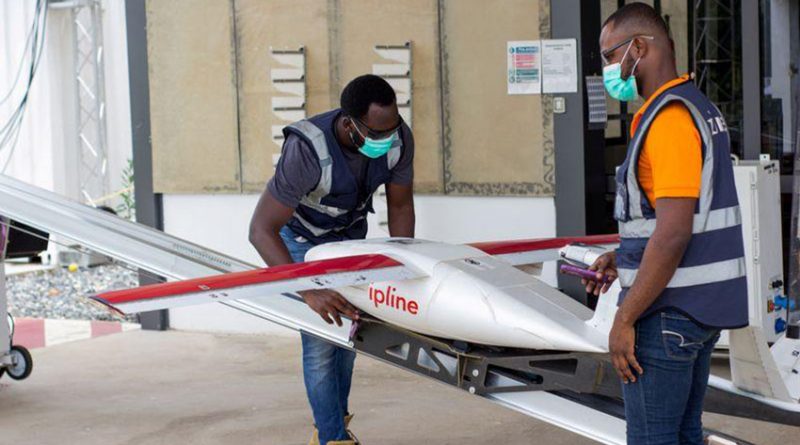CONGOLESE teenager Bienvenu dreams of owning a clothing business but spends his days illegally driving a motorbike taxi in busy Kinshasa to support his family during the COVID-19 pandemic.
Navigating traffic and dodging cops in the Democratic Republic of Congo’s capital, the 16-year-old has been working as an underage moto-taxi driver – the legal minimum age is 18 – since his uncle lost his travel agency job five months ago.
Bienvenu is one of thousands of Congolese children estimated by charities to have joined the labour force over the last year due to the new coronavirus. As schools shut, many children started working to help put food on the table at home.
Bienvenu – whose full name has been withheld – wants to stop driving but his relatives now rely on his income.
“It’s not my choice to do this job. I decided to do it in order to help my family, with my uncle’s blessing … every night I bring my earnings home,” he told the Thomson Reuters Foundation, sitting in a parking lot while scanning for clients.
With no reliable public transport, an informal network of moto-taxis – known as “Wewa” – is the main way many people in Kinshasa move around. Moto-taxis often carry whole families and huge deliveries while weaving through traffic.
“If I can find a secure job, I want to quit. I dream of one day being a great clothing merchant,” Bienvenu said. Working six days a week, most of his earnings go to the moto-taxi owner, leaving him with about 3,000 Congolese francs ($1.50) a day.
On the streets of Kinshasa – a sprawling metropolis of 17 million people – countless children sell everything from bags of crisps to face masks. Their ranks are swelling due to the economic fallout of COVID-19, child rights campaigners say.
About three-quarters of Congo’s 90 million people live in extreme poverty – surviving on less than $1.90 a day – and the African Development Bank has warned that its export-reliant economy could be particularly hard hit by the pandemic.
Congo is a key global producer of copper and cobalt and mining accounts for about a third of its national output. The pandemic slowed demand for metals last year, leading to mine closures and job cuts, but prices are recovering.
With more children seeking jobs to support their families, working for a moto-taxi owner is the most lucrative and appealing option, according to Annie Bambe, head of the NGO Forum for Youth and Children’s Rights in Congo (FODJEC).
“At first, it’s like a game and then it becomes a job,” Bambe said. “Adults should refuse to ride on motorcycles driven by children … owners must stop using children to make money.”
“No-one stands up to condemn this work,” she added.
NO CHOICE?
The National Road Safety Commission, part of the transport ministry, said it had limited resources to stop underage drivers and that traffic police could not “regulate the situation”.
“Everyone must get involved, in particular the mayors and heads of neighborhoods to discourage these children from driving,” said Jean Bome, the commission’s executive secretary.
Prior to the pandemic, about 15% of children aged 5 to 17 in Congo were engaged in child labour – mostly doing dangerous work – a 2019 report by the National Institute of Statistics found.
From the age of 15, children in Congo are permitted to do light work for a maximum of four hours per day with the approval of labour inspectors, but the legal driving age is 18.
Boys like Bienvenu have tactics for evading fines or arrest.
“I try not to arrive at crossroads where I can easily cross the path of traffic cops. If I am pulled over, I know how to negotiate with them,” Bienvenu said, explaining how he had paid bribes worth about 5,000 francs to avoid punishment.
One moto-taxi owner, Patrick Maweja, said he did not hire children but knew of several others who did because they saw young drivers as hard-working and reliable.
And the head of the Association of Moto-Taxi Drivers in Kinshasa’s Tshangu district, Jean-Pierre Kabangu, said he did not condone underage moto-taxi drivers but recognised that the pandemic gave some children no choice but to work.
For these children, Kabangu offered some advice.
“Underage drivers are asked to circulate in outlying districts and not to drive on the boulevard, which is very dangerous,” said Kabangu, whose association supports moto-taxi drivers and helps to mediate in disputes with traffic police.
Bambe of FODJEC said parents were also to blame for failing to stop their children from working as moto-taxi drivers.
“For many parents, the important thing is that the child brings back the fruits of their labour at the end of the day.”
This rings true for 17-year-old Joel who started driving his father’s moto-taxi in December while school was shut and plans to juggle working with his education, which has since resumed.
Joel said he sometimes feels ashamed when his classmates see him driving the moto-taxi, but must work to support his family.
“They don’t know that this job enables me to study,” said Joel – whose full name has been withheld – while fixing a flat tyre in a garage. “It’s my family’s bread and butter.”
NIGERIAN students have built a machine they hope can one day help hospitals remotely treat COVID-19 patients, taking temperatures, transporting medicine and allowing medical workers to communicate with patients with a webcam and screen.
The robot is a remote-controlled cabinet on wheels, decked out with a vibrant, floral pattern and dubbed “MAIROBOT”.
In a demonstration, a school nurse loaded MAIROBOT with medicine and a student, using a controller and goggles to see through a camera, trundled the machine through a corridor and into a mock isolation room to scan a student’s forehead for her temperature.
“I hope this MAIROBOT can curb and reduce the risk that these health personnel get – I want health workers to be safer,” said Nabila Abbas, one of the robot’s creators.

The robotics team at the Glisten International Academy in Nigeria’s capital Abuja started out trying to build MAIROBOT by collaborating online but eventually had to come together to finish the project in their lab.
But MAIROBOT, which took about three months to build, is still in its early days. During the demonstration, the isolation room door had to be left open for it, and it can only carry medication, so patients would self-administer while a nurse watches over the camera.
“Right now we are working on upgrading it,” said David Adeniyi, the teacher overseeing the robotics team, who says the students hope to make MAIROBOT commercially available one day.
For Abbas, the robot’s use will not stop at the coronavirus.
“Other infectious diseases can also be curbed using MAIROBOT like Ebola, Lassa fever and all these infectious viruses,” she said.
Source – Thomson Reuters Foundation
NIGERIAN artist Olufela Omokeko carefully arranges fresh peppers on wooden boards hanging in a bare room. Instead of providing spice in a meal, he wants them to encourage people to obey measures that will stop the spread of the coronavirus.
His pieces, comprising of red, yellow and green peppers mounted on boards and tomatoes hanging from nets, will rot during the lifespan of the exhibition in Lagos. The decay reflects the food wasted during lockdowns last year, said the 30-year-old artist.
“I created this art space as a reflection of the scarcity… and numerous challenges that we experienced at the early stage of the pandemic,” Omokeko said.
Lockdowns were imposed from late March until early May last year in Lagos, Nigeria’s commercial hub, and the capital, Abuja. The restrictions, coupled with a ban on nationwide interstate travel, disrupted supply chains which led to widespread hunger, while food rotted in fields or at depots.
“I don’t want us to go back to that stage again and my only advice is for the masses to use their face masks just to avoid another lockdown,” he said.
He fears authorities may enforce more restrictions as the country grapples with the second wave of COVID-19 infections that has seen the number of cases rise sharply in recent weeks.
Public health officials have repeatedly warned that Nigerians are failing to heed guidance on observing social distancing and wearing masks. Many opt to wear masks around their chin, rather than over their mouth and nose.
Omokeko hopes the sight of his rotting peppers, oozing liquids and giving off a pungent smell, will provide a visceral warning of what may happen if safety advice is ignored.
“I’m not wasting this material,” he said. “I’m using it to raise the consciousness of the masses.”
Source – Thomson Reuters Foundation
NIGERIA’S Kaduna state has signed a deal with medical delivery firm Zipline that will allow drone shipment of COVID-19 vaccines without significant state investment in cold-chain storage, the company has announced.
Kaduna’s partnership with Zipline, which delivered more than 1 million doses of other vaccines in Africa over the past year, will also enable on-demand delivery of blood products, medications and other vaccines.
“It will help ensure that millions of people in Kaduna State will always get the care they need,” Kaduna Governor Nasir El-Rufai said.
Zipline said its end-to-end cold chain distribution capability, which can safely deliver even the Pfizer vaccine, would allow Kaduna health facilities to bypass purchases of ultra-low freezers and enable on-demand deliveries of precise amounts of COVID-19 vaccines.
The company said it is working with an unnamed “major COVID-19 vaccine manufacturer” to enable access to COVID-19 vaccine deliveries in all the markets where it operates. It currently offers drone delivery of blood, vaccines and other medical equipment in Ghana, Rwanda and the United States.
Zipline is also in talks with other states in Nigeria.
Nations across Africa, with limited cold-chain storage and poor road and rail networks, are grappling with how to deliver COVID-19 vaccines that require ultra-low temperature storage.
The Pfizer vaccine must be stored at around -70 degrees Celsius (-112°F) before being sent to distribution centres in specially designed cool boxes filled with dry ice.
Nigeria has said it will seek vaccines that are less dependent on cooling facilities.
Kaduna services are slated to begin in the second quarter, with round-the-clock service from three distribution centres with 30 drones each.
El-Rufai said Kaduna had also upgraded 255 primary health centres, installed a pharmagrade warehouse and is recruiting and training 3,000 officers to manage the facilities.




